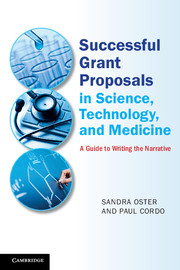
 For more Grants & Funding resources, search BOTH links below:
For more Grants & Funding resources, search BOTH links below:
| Find Journals and E-Books |
| Library Catalog |
 Successful Grant Proposals in Science, Technology, and Medicine
by
There are many resources on grant writing in science, technology and medicine, but most do not provide the practical advice needed to write the narratives of grant proposals. Designed to help novice and experienced investigators write compelling narratives and acquire research funding, this is a detailed guide to the content, organisation, layout, phrasing, and scientific argumentation of narratives. The authors draw on more than twenty years of research and analysis of grant proposals, having worked extensively with investigators at different levels, from pre-doctoral students to senior scientists. They have used this experience to design a framework for scientific writing that you can apply directly to narratives. The guidelines and advice offered are applicable across many funding agencies, including the NIH and NSF. Featuring many real-life examples, the book covers a range of topics, from organisational alternatives to best practices in grammar and editing, overview visuals, and working with contributors.
Successful Grant Proposals in Science, Technology, and Medicine
by
There are many resources on grant writing in science, technology and medicine, but most do not provide the practical advice needed to write the narratives of grant proposals. Designed to help novice and experienced investigators write compelling narratives and acquire research funding, this is a detailed guide to the content, organisation, layout, phrasing, and scientific argumentation of narratives. The authors draw on more than twenty years of research and analysis of grant proposals, having worked extensively with investigators at different levels, from pre-doctoral students to senior scientists. They have used this experience to design a framework for scientific writing that you can apply directly to narratives. The guidelines and advice offered are applicable across many funding agencies, including the NIH and NSF. Featuring many real-life examples, the book covers a range of topics, from organisational alternatives to best practices in grammar and editing, overview visuals, and working with contributors.